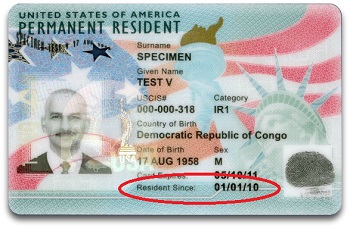
As a permanent resident, you are generally eligible for naturalization after five years. This is the most common way that people apply to become a U.S. citizen.
To qualify, you must have lived in the U.S. continuously for the five years immediately preceding the date you file Form N-400, Application for Naturalization. The Immigration and Nationality Act (Title III, Chapter 2) details all of the citizenship requirements for a 5-year permanent resident. We explain it in simple terms here.

To apply under this eligibility category, you must be 18 years of age or older.
Be a permanent resident (green card holder) for at least 5 yearsYou must have your permanent resident status for 5 years before filing Form N-400, Application for Naturalization. Your time as a permanent resident begins the day you were granted permanent resident status. You can find the date on your green card next to "Resident Since."

However, the rules do allow you to file your Form N-400 application up to 90 days before the 5-year anniversary of your admission date. In the example above, a person who has been a permanent resident since 1/1/2010 would meet this requirement on 10/3/2014. That's 90 days before they reach the 5-year mark.
Has continuous residence in the U.S. as a permanent resident for 5 years before filing the application
Continuous residence means that the you have maintained residence within the United States for a specified period of time. The continuous residence requirement helps you demonstrate that you have begun to integrate with American community and intend to stay in the U.S. Therefore, you must have continuous residence in the United States as a lawful permanent resident for 5 years immediately preceding the date of filing N-400, Application for Naturalization.
You may take trips abroad but must maintain ties to the U.S. For example, during your trip abroad you continue to file taxes, maintain a residence, and intend to return to the U.S. If you plan to apply for citizenship, keep your trips outside the United States less than 6 months. USCIS will presume that any absences of 6 months or more have disrupted your continuous residence requirement.
You must also reside continuously within the United States from the date of filing the application until the time naturalization is finalized. Again, you may take a trip abroad during the naturalization process, but you cannot relocate your home to another country.
If you are engaged in certain kinds of overseas employment -- such as working for the U.S. government or U.S. Armed Forces -- you may be eligible for an exception to the continuous residence requirement. For more information review our Continuous Residence and Physical Presence Requirements for Naturalization page.
Has been physically present in the U.S. for at least 30 months out of the 5 years before filing the application
Physical presence refers to the number of days you must be physically present in the United States during the statutory period and up to the date of filing for naturalization. USCIS wants to know that you genuinely want to become a citizen. Like continuous residence, the physical presence requirement helps you demonstrate that you have begun to integrate with American community and intend to stay in the U.S. Therefore, you must be physically present in the United States for at least 30 months out of the 5 years immediately preceding the date of filing Form N-400.
Physical presence is a cumulative requirement. Therefore, you must combine the number of days of all your trips outside the U.S. If you are engaged in certain kinds of overseas employment -- such as working for the U.S. government or U.S. Armed Forces -- you may be eligible for an exception to the physical presence requirement. For more information review our Continuous Residence and Physical Presence Requirements for Naturalization.
Has lived within the state for at least 3 months before filing the applicationIn addition to the continuous residence and physical presence requirements for citizenship, you must have lived within the same state (or USCIS district with jurisdiction over the applicant’s place of residence) for at least 3 months prior to the date of filing Form N-400, Application for Naturalization.
Therefore, if you have recently moved to a new state, you must wait 3 months before filing Form N-400.
Be able to pass the English test as well as U.S. history and government testGenerally, you must be able to read, write, and speak English and have knowledge and an understanding of U.S. history and government (also known as civics). You shouldn't be intimidated. You only need a basic level of English. It's also very easy to study for the civics test. CitizenPath can show you How to Prepare for the U.S. Citizenship Test & Interview.
USCIS does provide some English language exceptions and medical disability exceptions for those who qualify. You are not required to take the English language test if:
USCIS also provides accommodations for individuals with disabilities. Learn more on the USCIS Exceptions & Accommodations page.
Be a person of good moral characterEverybody makes mistakes; you aren't expected to be perfect. The United States wants new citizens to be of good moral character, attached to the principles of the Constitution of the United States, and well disposed to the good order and happiness of the United States during all relevant periods under the law. Examples of things that might demonstrate a lack of good moral character include but aren't limited to:
If you are concerned that your moral character may be in question due to even a minor incident, you should consult an immigration attorney before filing Form N-400.